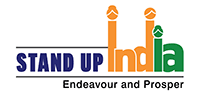| Stand-Up India | |
|---|---|
 | |
| Country | India |
| Prime Minister(s) | Narendra Modi |
| Launched | 5 April 2016 |
| Website | www |
Stand-Up India was launched by the Government of India on 5 April 2016 to support entrepreneurship among women and SC & ST communities. Stand Up India Loan Scheme is a government initiative launched by the Government of India in 2016 to promote entrepreneurship and facilitate bank loans to Scheduled Caste (SC) / Scheduled Tribe (ST) and women entrepreneurs in the country. The scheme aims to provide loans between Rs.10 lakhs and Rs.1 crore for setting up a greenfield enterprise in manufacturing, trading or services sector. [1]
Contents
It is similar to but distinct from Startup India. Both are enablers and beneficiaries of other Government of India schemes, such as Make in India, Industrial corridor, Dedicated Freight Corridor, Sagarmala, Bharatmala, UDAN-RCS, Digital India, BharatNet and UMANG.